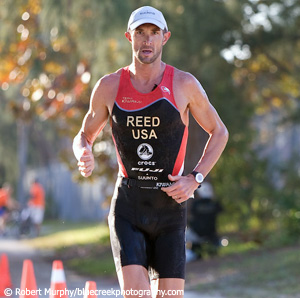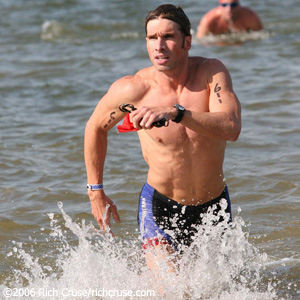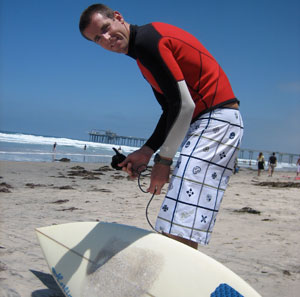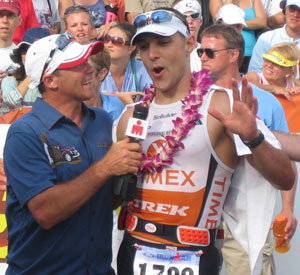Meet Janda Ricci-Munn
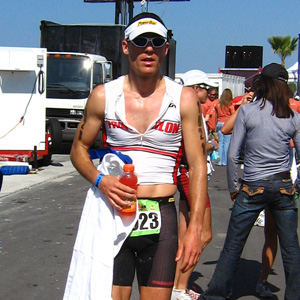
Janda Ricci-Munn had a tough setback in 2007 but closed out his season as the fastest age grouper at 70.3 Worlds in Clearwater and a top 20 finish overall. He has announced that he has turned professional for 2008 and confirmed that he'll actually quit one of his other day jobs.
ST: Janda, tell us a bit more about yourself. What do you do when you are not racing triathlons?
Janda: At the moment, I'm juggling 2 professions: In addition to serving as a Middle School/High School P.E. & Health Teacher, I own and operate a fairly successful coaching business. I'm currently training over 30 athletes, the vast majority of whom are triathletes. When I'm not working or working out, I enjoy spending time with my girlfriend Michelle, and my friends and family. We live in beautiful Gloucester, MA and you might have heard of it if you ever read Sebastian Junger's "The Perfect Storm". Gloucester is located right on the ocean, so there's plenty to do outside, year round. When I do have some free time, I really enjoy going to the beach, rock climbing, and a lot of other simple past times like BBQ, raspberry picking and going for walks along the waterfront with Michelle.
ST: You were the top amateur and top 20 overall at 70.3 Worlds in Clearwater. Would you consider that result your biggest achievement?
Janda: I suppose that from a results standpoint, Clearwater was my biggest achievement to date, but personally, it doesn't really rank as my proudest moment. After a 4 year hiatus, I returned to the sport back in May of 2006 and had a pretty good year. I won my age group at Clearwater that year and raced with a good deal of success on the regional level as well. Heading into 2007, I knew that I was capable of more so I set my sights on a sub 4 hour 70.3 performance and the overall AG title at Clearwater. I was confident that with a little extra training I could achieve both results. My first big race of the '07 season was Eagleman 70.3. I spent the winter and spring of '07 prepping really hard for that race, which isn't an easy thing to do when you have to deal with the weather we're blessed with here in New England!
Anyway, about 6 weeks before Eagleman last year, I started passing blood on a fairly regular basis and suddenly, all of my goals seemed like they were suddenly in jeopardy. I won't go into the gory details, but it was a very stressful period in my life. I was really worried that I might have a serious health problem on my hands. I went to the doctor and they wanted to schedule me for a procedure immediately (this was a few weeks before Eagleman). Although in retrospect it wasn't the smartest decision I've ever made, I opted to schedule the procedure post Eagleman. I figured that if I was in fact dealing with some sort of catastrophic health issue that I wanted one crack at the 70.3 distance before I might have to pack things in for the year, or possibly for good.
Thankfully, I went on to break 4 hours at Eagleman(3:57)and took the overall AG title in the process. MD's Philippe Kozub, an athlete that I respect very much, gave me a good run for my money that day. I was hoping that we'd have a chance to duke it out again at Clearwater, but the match up didn't materialize the way that I had hoped it would.
Post Eagleman I really came unglued emotionally thanks to the stress I had been dealing with. I took some time off from training to deal with the health issue, and thankfully, after a relatively painless surgical procedure, was good to go. No "C" word and I was cleared to resume training.
Holding it together mentally and pulling off that performance at Eagleman is something that I'm pretty proud of, and in my book at least, it was a much bigger personal accomplishment than my taking the overall AG title at Clearwater. I can't say that I'm a big fan of the type of "racing" that goes down at Clearwater anyway; way too many people catch free rides from T1 all the way back to T2 and the majority of the results you're seeing there have to be taken with a grain of salt (or spoonful in some cases!). I'm very proud of the fact that I raced an ultra clean race at Clearwater when winning the overall AG title, but the drafting that goes on in that race is despicable. I had to shake a pace line of 10+ guys off my rear wheel at one point. It was out of control. Anyway, I digress. As you can see, I'm still fuming about my experience with that event.
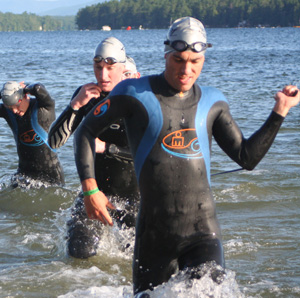
ST: Can you tell us about your athletic background?
Janda: I began running at the age of 7 or 8 in addition to playing pee-wee football and little-league baseball. Thanks to my father's coaching and support, I enjoyed a pretty successful youth running career, and ended up winning a bunch of state and regional titles in X-C/Track & Field. If memory serves me correct, I ran a 4:53 1 mile back in 7th grade.
I competed in my first triathlon at the age of 19. I was the only guy there without a wetsuit and my swim training consisted of 2 x 5 min. open water swim sessions the week before the race. The water temperature was 55 degrees on race day and I spent most of the swim either hyperventilating or doing the doggy paddle. I still pulled off a 4th place overall finish though and more importantly, loved every second of the experience!
ST: What does a typical training week look like for you?
Janda: It all depends upon what point in my annual progression I am of course, but at the moment a typical "working" week for me might look something like 12,000 yards of swimming (lots of technique work + moderate amount of quality), 9 – 10 hours of cycling (lots of aerobic quality/pace work) and40 miles of running (mix of distance and quality). I'd like to do more, but that's about all that I can currently muster given my coaching/teaching workload. I'm looking forward to June 23rd, though, as that date marks my final day as a teacher! I'm leaving the field to concentrate full time on my coaching operation and triathlon career (I'm racing Pro this year). In addition to being able to train more, I'll finally have the opportunity to squeeze in all of the "extras": Sleeping enough, making time for additional R&R, resistance training, massage, etc. As it stands, I work 7 days per week and squeeze the training in around my hectic schedule. Not a good idea if you're trying to race successfully in the elite wave. I'm very fortunate to have an extremely understanding and supportive girlfriend in Michelle though, as she never complains about my being so busy. She's a fellow athlete herself and travels with me to all of my races. I couldn't do what I do without her, that's for sure.
ST: As Pro you'll need sponsors, what can you tell us about what is going on for you in that regard?
Janda: I'm very excited to announce that, along with Elite triathletes Will Ronco of CO, and Chris Bagg of VT, I'm part of a new Pro Tri Team that will be debuting in 2008: The Craft Cervelo Karhu Tri Team. Team specifics and co-sponsors will be announced soon, but I will state for the record that team members will be outfitted by title sponsors Craft-USA/Karhu with apparel and shoes, and by Cervelo with TT bikes. I'm also very thankful for the support I receive from my long time sponsor PowerBar and my new sponsor for 2008, blueseventy! I was just notified of my blueseventy sponsorship this past week and am ecstatic to be working with them. In addition, I've been fortunate to receive support from PowerTap, Zipp Wheels and Fit Werx 2 this season. Triathlon is an expensive sport, so I'm very grateful for the generosity that has been extended my way.
ST: Could you describe your hardest training session/day for us?
Janda: Toss up: Either a hard pace ride (i.e. 60 – 80k at 70.3 goal pace/wattage) or intensive brick (i.e. 4 hour ride over rolling terrain with final 1 hour @ 70.3 goal wattage followed by 30 minutes of intensive running). Neither of those sessions are much fun, but I consider them to be necessary evils when training for the 70.3 distance. I wouldn't recommend executing sessions like that all the time though as they take too much out of you (that's my feeling on the matter at least).
ST: How do you recover from a longer triathlon?
Janda: I take a week after 70.3 events and lay low. I'm not one of the most talented athletes out there, so I have to push myself pretty hard during both training and racing in order to hold my own against the top dogs. I'm wrecked for about 7 – 10 days after a 70.3 event and need ample time to let my mind and body bounce back from the effort that went in to the race and the training that led up to it. I might spin out a few times, go for a few 30 minute jogs and maybe swim in the ocean here or there, but that's about it. For the most part, I try to use my recovery weeks to do all the things I don’t have time for when I'm training hard: Sleeping in, staying out a little later, hitting the beach, etc.
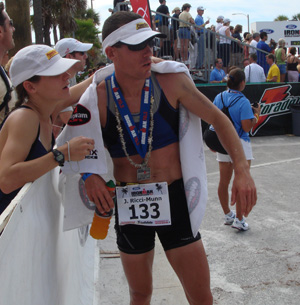
ST: What are you doing in terms of activities in the off-season?
Janda: I take 2 weeks completely off at the end of the season, but outside of that, I train with a high degree of structure and focus year round. Although my total training volume is a good 40 – 50% lower during the winter months, the actual training isn't necessarily any easier. I spend the "off season" building up my run base while executing a lot of over-distance and hill training. I keep my cycling sessions short and "sweet," and rarely ride more than 5 hours per week. Swimming: Mix of masters and solo technique oriented sessions. I should swim more, but it's hard to find the time and energy thanks to my teaching and coaching load.
ST: Can you tell us what you have on schedule for the 2008 season?
Janda: "A" races this year are Eagleman 70.3, Rhode Island 70.3, Timberman 70.3, Muskoka 70.3 and as long as my body is injury free and ready for the training post Muskoka, I'm tentatively planning on ending my year with Ironman Arizona. In addition to a handful of local short course events that I'll use as tune ups for my "A" races, I'm also headed down to Maryland for the Columbia Triathlon on May 18th. I won't hide the fact that I'm a bit unnerved about the idea of being in the same wave as guys like Macca, Matty Reed, Greg Remaly, etc. But I keep trying to remind myself that this event is nothing more than a tune up for Eagleman, so I should take the pressure off myself and just enjoy it. Easier said than done.
ST: What is your favorite race anywhere and why?
Janda: Timberman 70.3. Keith Jordan is hands down the best race director in the country and he puts on great events. I also like the New Hampshire/White Mountain setting. It's an easy drive from Gloucester (about 2.5 hours) and my friend's family owns a lake house just 2 miles from the starting line. My friends and family all come up to watch the race and it makes for a very exciting weekend. I can't wait to race in the "Pro" wave at this year’s event!!!
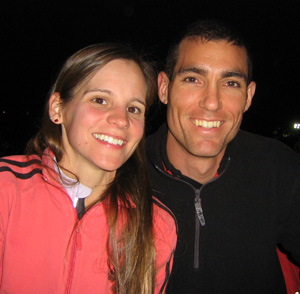
ST: What is your favorite food?
Janda: Italian. To be specific: Seafood Marinara from "The Causeway Restaurant" in Gloucester.
ST: Do you have any preferences in terms of music?
Janda: Laid back/positive vibe. I'm not too picky. If I like the way it sounds, I listen to it.
ST: Do you have any tips/suggestions for age group athletes?
Janda: If I could give one word of advice, it would be this: Take the available training time that you have and make it count. Far more often than not, it seems that people focus first and foremost upon training volume and never take the time to identify the exact forms of physiological and psychological stress they'll be subjecting their bodies to on race day. Case in point: Although laying down big volume/low intensity training sessions on the bike will give you the confidence and endurance you need to complete a 40k or 90k during an Olympic distance or 70.3 event, if you're not including enough work at or above your goal paces/wattage zones, you're sure to falter on race day and risk not only blowing up on the bike, but getting shelled on the run as well. Bottom line: If you're looking to do something specific on race day (i.e. hold a certain pace/power output), your body better be prepared. Training volume, and lot's of it, isn’t necessarily a bad thing, but it’s what you're doing with the available training time that you have that's most important.
ST: Where do you think you'll be in 5 years?
Janda: Hopefully wrapping up a successful pro career as a long course specialist and still coaching full time!


